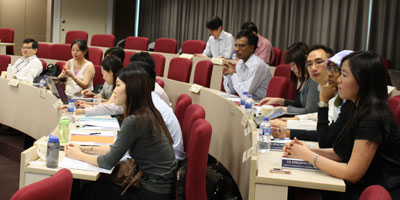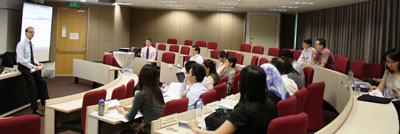Information
Venue
Start
End

The Centre for International Law (CIL) organised a 3-day Executive Programme on Technical Training Course on International Investment Treaties on 14, 15, 16 March 2011 for Singapore Government Officials.
Trainer J Christopher Thomas, Q.C., is a lawyer and Chartered Arbitrator who has practiced in the field of international trade and commercial law with emphasis on trade and investment regulation, and dispute settlement. He has acted as counsel in various international disputes, in domestic administrative law procedures (anti-dumping and countervailing duty cases) and in contentious proceedings before the superior courts of Canada. He has also acted as legal counsel in more than a dozen investor-State cases and as an arbitrator in thirteen such cases. He has advised many States, including Singapore, on the structure and content of international trade and investment agreements.
Co-Trainer Morgan D Maguire is a lawyer and assistant editor of InvestorStateLawGuide.com (ISLG), a comprehensive online research database for international investment treaty arbitration. He graduated from Queen’s University with a Juris Doctor in 2008 and was called to the Bar of the Province of British Columbia after completing his articles in 2009. In 2006, he attended the Queen’s International Study Centre in Hertsmonceux, U.K. and received a certificate in International Business Law. Prior to law school, he obtained a Bachelor of Arts in Economics and History from McGill University in 2004.

This 3-day programme focused on the explosion of international investment treaty-making (and the many disputes arising under such treaties) in the last two decades, a trend that shows few signs of abating.
States like Singapore, which are major investors abroad as well as recipients of foreign investment, have dual interests when negotiating investment protection treaties. On the one hand, they look to protect their investors’ interests abroad against the vagaries of governmental action. On the other, they must be concerned that the legal obligations sought from other States are ones that they can meet without finding them too onerous or intrusive in terms of their own governmental decision-making.
Many States have found that a treaty that their officials thought was clear and concisely drafted turned out to be more susceptible to unexpected interpretation than believed at the time of its negotiation. Many States have gone back to the drawing board to try to more clearly articulate the legal standards that should be expressed in treaty language. Accordingly, negotiators should have a firm grasp of the process of dispute settlement under investment treaties. This will better enable them to identify potential pitfalls and problems in the application of the treaties that they negotiate.

The course was designed for officials who are concerned with the negotiation of investment treaties, and those who advise them. It would also be useful to officials involved in the structuring of significant international investments by sovereign wealth funds or GLCs so as to better protect such investments abroad. It was designed to bridge the gap between policy and law. Legal training was not required.

